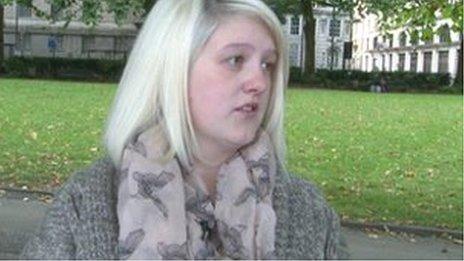NI abortion law: Jane Christie says she is devastated by first minister's comments
- Published
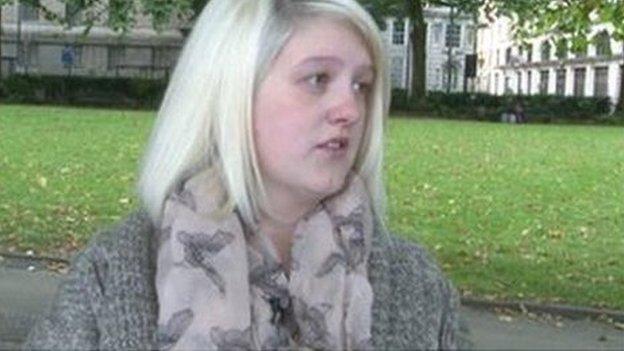
Sarah Ewart spoke to the BBC in 2013 about her experience of travelling to England for an abortion
The mother of a woman who faced carrying her baby until it died in her womb has said she is devastated by the DUP leader's comments that attempts to change the abortion law are doomed.
Jane Christie's daughter Sarah Ewart had to decide whether to travel to Great Britain for a legal termination.
Justice Minister David Ford has recommended a change in the law.
However, First Minister Peter Robinson said draft guidelines to be published soon provided a better way forward.
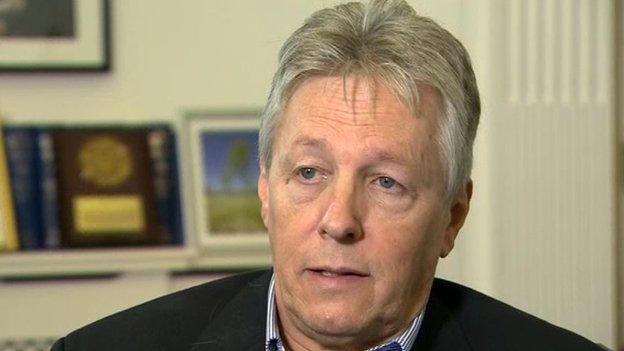
Peter Robinson said guidelines would provide a better way forward than legislation
At present abortion is only permitted under law in Northern Ireland to save a woman's life, or if there is a risk of permanent and serious damage to her mental or physical health.
The issue of fatal foetal abnormality came to public attention when Sarah Ewart contacted the Nolan Show to highlight the choice she faced - of either carrying her baby until it died in her womb or travelling to Great Britain where she could access a legal termination.
Mrs Christie told the Nolan Show on Friday that she and her daughter had met Mr Robinson and other DUP members on a number of occasions.
She said she had believed that they were in favour of changing the law in these "exceptional circumstances".
"He said he had a difficult job with some of his party members, but that he understood and he was prepared to help," she said.
"We were being led to believe we were going to get the help, by a number [of people] in the party."

Justice Minister David Ford brought forward his plan for legislation following a consultation
Amnesty International described Mr Robinson's latest comments as "disingenuous".
"Peter Robinson knows full well that any new guidance from the Department of Health on the existing law cannot address a glaring gap in that law," said spokeswoman Grainne Teggart.
The issue of fatal foetal abnormality has been examined by health and justice officials over the past 18 months, following the publicity surrounding Sarah Ewart's case.
Mr Ford had put forward his plan for legislation in such cases following consultation on reforming Northern Ireland's abortion law.
Draft guidelines on abortion law, released by the Department of Health in 2013, stated: "Foetal abnormality is not recognised as grounds for termination of pregnancy in Northern Ireland."
Mrs Christie said she also attended a meeting with Mr Robinson that was attended by hospital consultants who made it clear to the first minister that they had sought legal advice through the High Court and were told an abortion could not be safely carried out through guidelines, and that there had to be a change in the law.
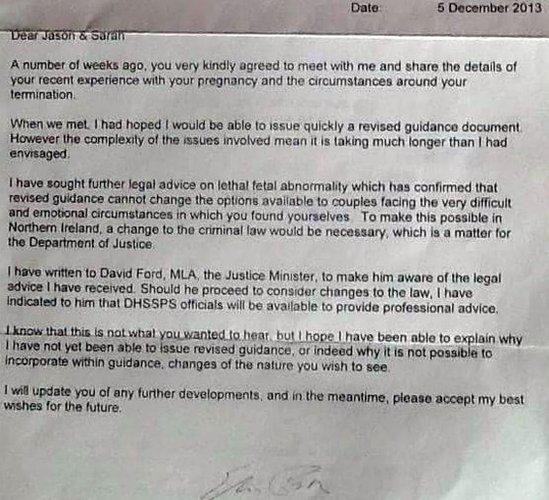
A copy of a letter sent from the then health minister Edwin Poots to Sarah and Jason Ewart
"He turned to the senior adviser to the health minister, Philip Weir, and said that having spoken to the consultants, he realised it couldn't be done through guidelines," Mrs Christie said.
Sarah's mother also told the programme she was in receipt of a letter from the then health minister Edwin Poots in which he outlined his view that any changes to the law would "not work through guidelines".
"It's there in black and white", she said.
In response, Mr Poots told the Nolan Show he had met Mrs Christie and her daughter Sarah a number of times.
The former health minister said he did not recall saying that he told the family he would support a change in the law regarding fatal foetal abnormality.
"I did agree to look at the guidelines again and believe that the matter is better dealt with there than through legislation", Mr Poots said while outlining correspondence he had had with the family.
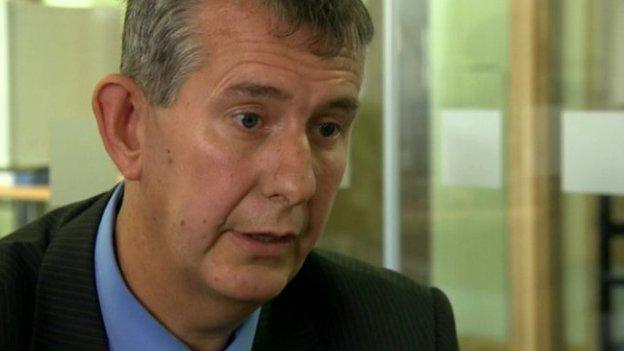
Mr Poots said work had been "ongoing" since he left the health ministry
"Legislation has been introduced by well meaning people in the past which was to be restrictive, but has ended in abortion on demand and I believe the problems you encountered can be resolved without legislation and managed through guidance."
Mr Poots said work had been "ongoing" since he left the health ministry.
"We're convinced that we're better seeking to resolve this through guidelines as things stand," he said outlining his party's position.
"Revised guidelines won't change the law and the law is very consistent in Northern Ireland.
"However, doctors are in a position where they can make assessments and those assessments can be on a whole series of things, so the guidelines can do things in around what doctors make those decisions."

Abortion law and Northern Ireland
The laws covering abortion in Northern Ireland are the 1861 Offences against the Person Act, and the Criminal Justice act from 1945. It is a criminal offence, which carries a life sentence.
The only exceptions are to save a woman's life, or if there is a risk of permanent and serious damage to her mental or physical health.
More than 1,000 women a year who do not fit in these categories travel from Northern Ireland each year to have an abortion in other parts of the UK.
In England, Wales and Scotland access to abortion is covered by the 1967 Abortion Act. That permits terminations up to 24 weeks of pregnancy on grounds that include risk to the physical or mental health of the woman or existing children in the family, and abnormalities that could lead to a child being "seriously handicapped".
It is also allowed over 24 weeks if a woman's life or health is at serious risk, and for serious disabilities.
- Published1 May 2015
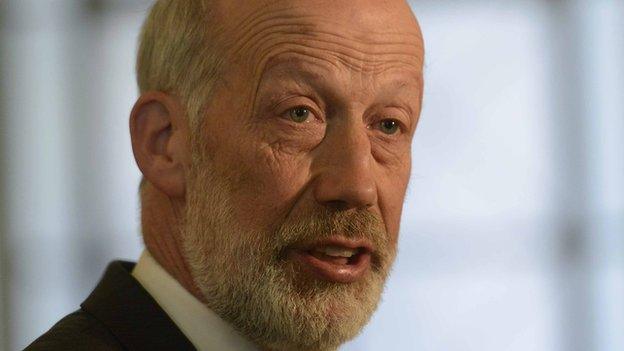
- Published16 April 2015
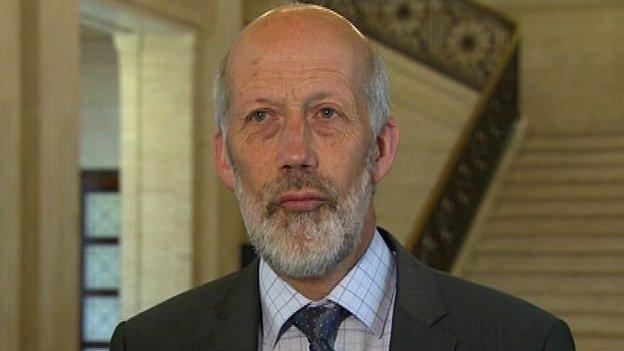
- Published18 August 2014
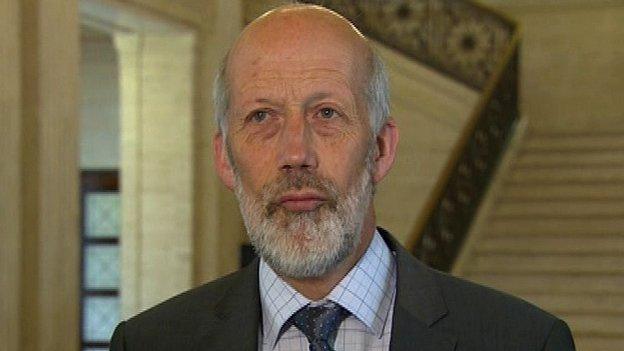
- Published5 December 2013
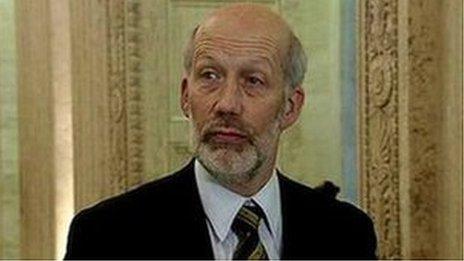
- Published9 October 2013
